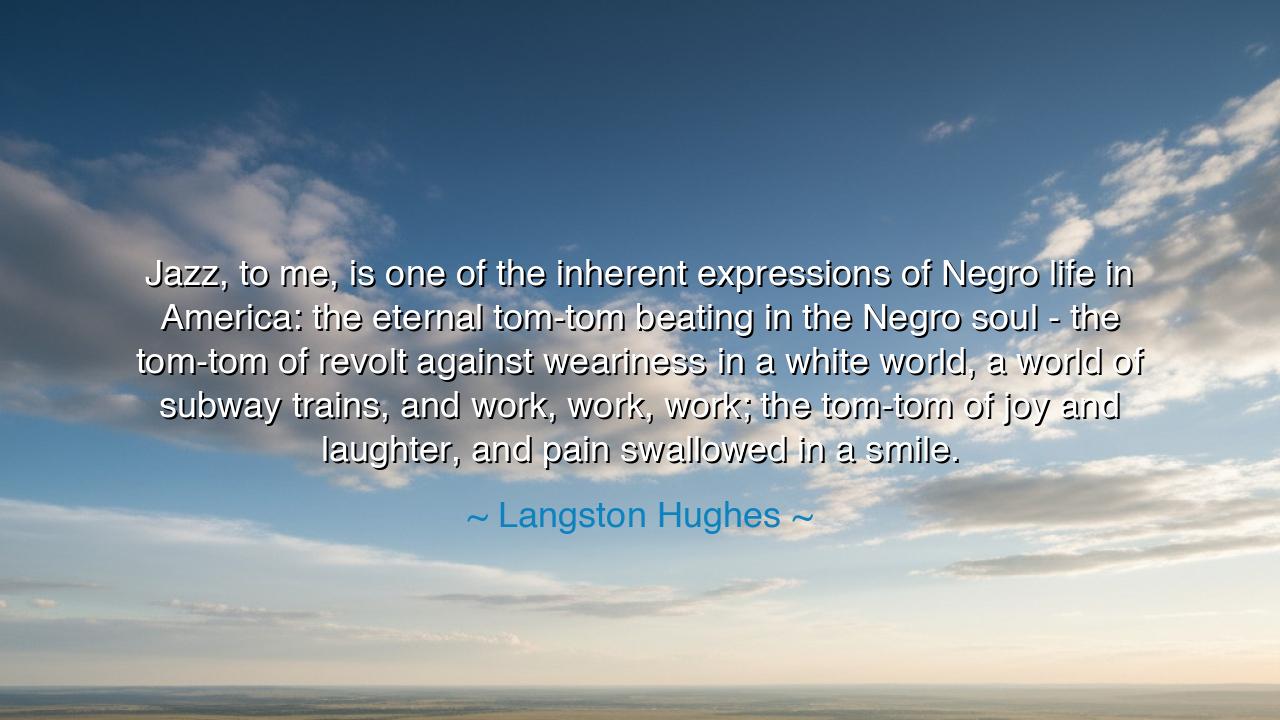
Jazz, to me, is one of the inherent expressions of Negro life in
Jazz, to me, is one of the inherent expressions of Negro life in America: the eternal tom-tom beating in the Negro soul - the tom-tom of revolt against weariness in a white world, a world of subway trains, and work, work, work; the tom-tom of joy and laughter, and pain swallowed in a smile.






Hear the words of Langston Hughes, poet of the Harlem Renaissance, who gave voice to the struggles and triumphs of a people: “Jazz, to me, is one of the inherent expressions of Negro life in America: the eternal tom-tom beating in the Negro soul—the tom-tom of revolt against weariness in a white world, a world of subway trains, and work, work, work; the tom-tom of joy and laughter, and pain swallowed in a smile.” In these words, Hughes reveals that jazz was not merely music, but the heartbeat of a people, a rhythm of survival, resistance, and resilience.
The origin of this truth lies in the history of African Americans, who carried rhythms from the motherlands of Africa into the plantations, the fields, and later, the cities of America. The drums, once forbidden by slaveholders for fear of rebellion, lived on in the body, in the clapping of hands, in the stamping of feet, in the cries of spirituals. Out of sorrow, oppression, and longing, a new music was born—jazz, a sound both mournful and jubilant, both aching and defiant. Hughes saw in it the tom-tom of his people’s soul, never silenced, always beating.
The tom-tom was the ancient drum of Africa, calling the people to gather, to dance, to resist, to hope. In America, it became invisible yet unbroken, reemerging in syncopated rhythms, in improvisations that defied rigid rules. Hughes calls it “the tom-tom of revolt,” for jazz was a cry of freedom against endless toil, against the dehumanizing machinery of industrial life—“the subway trains, and work, work, work.” It was the sound of human spirit saying: we are more than your machines, more than your labor—we are alive, and our souls cannot be crushed.
Yet Hughes also knew that this tom-tom was not only resistance, but joy. It was laughter at the edge of despair, triumph hidden inside pain, sorrow transformed into beauty. Jazz was the smile that swallowed suffering without denying it, the music that carried grief yet sang it into celebration. It was both wound and balm, both a testimony of endurance and a prophecy of freedom. This is why jazz could make the world dance while still carrying the scars of chains.
History bears witness. Think of Louis Armstrong, his trumpet ringing like sunlight over darkened skies. His music lifted the weary, yet behind his playing was the weight of discrimination he endured. Still, he smiled, he laughed, and he filled the world with joy. Armstrong’s life embodied Hughes’s words: pain swallowed in a smile, transformed into a gift that outlived the prejudice that sought to silence him.
Hughes’s vision is heroic, for it teaches that art itself can be resistance. Jazz was not created in luxury but in hardship, not in freedom but in the yearning for it. Yet from this struggle came beauty that reshaped the world. In its improvisation, it defied conformity; in its rhythm, it declared endurance; in its very existence, it proclaimed dignity in the face of oppression. This is why Hughes calls it the “eternal tom-tom”—because it carried within it the unbroken pulse of a people’s soul.
The lesson is clear: when life is heavy, when the world presses with endless labor and sorrow, do not let your spirit fall silent. Find your tom-tom—your rhythm of resistance, your song of survival. Express your pain, but transform it into beauty; let your laughter rise even through tears; let your smile carry defiance against despair. For as Hughes teaches, in every age and every struggle, art, joy, and resilience are the weapons by which the soul remains unconquered.
Therefore, beloved, let this be your practice: live as though your life itself were jazz—improvised, resilient, filled with both sorrow and joy. When the world demands weariness, let your soul give rhythm. When oppression presses down, let your spirit sing. And above all, remember Hughes’s vision: that even pain, when met with courage and transformed in love, can beat like a drum into eternity, carrying not only your story, but the story of all who come after you.






AAdministratorAdministrator
Welcome, honored guests. Please leave a comment, we will respond soon